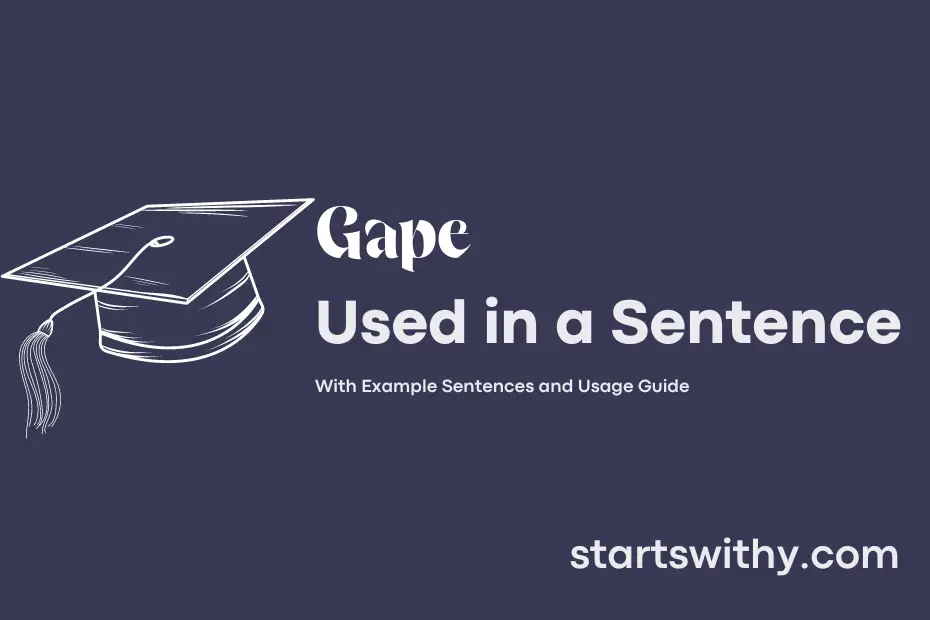Ever found yourself staring in wonder or shock, mouth agape, at something surprising or astonishing? That wide-eyed, jaw-dropping moment of astonishment, that’s what we call “gape.”
“Gape” is a verb that describes the act of opening the mouth wide, often due to surprise, awe, or disbelief. It captures that instant when your mouth falls open in response to something that leaves you speechless, prompting a silent expression of wonder or shock.
7 Examples Of Gape Used In a Sentence For Kids
- The children gape at the beautiful peacock.
- The puppy made the student gape with its funny antics.
- The huge elephant made everyone gape in wonder.
- In the dark cave, the children gape at the glowing crystals.
- The magician’s trick made the audience gape in amazement.
- The teacher made a silly face, causing the students to gape and giggle.
- The colorful balloons made the kids gape with excitement.
14 Sentences with Gape Examples
- Gape at the intricate architecture of historic monuments during a college field trip.
- While studying late at night, gape in astonishment at how quickly time has passed.
- Students couldn’t help but gape at the impressive performance during the college cultural fest.
- Gape at the stunning sunset view from the college campus rooftop.
- In the library, students often gape at the vast collection of books available for reference.
- During a college seminar, attendees gape at the renowned speaker’s insights on sustainable development.
- Touring the science lab for the first time, students gape at the advanced equipment available for experiments.
- Friends gape in amazement at the talented singer during a college music competition.
- In the college canteen, students gape at the variety of dishes available for lunch.
- During a film screening event, the audience gape at the emotion portrayed by the actors on screen.
- In the computer lab, students gape at the speed at which the high-performance computers can process data.
- At the college sports meet, spectators gape at the agility of the athletes competing.
- In the college auditorium, students gape at the elaborate set design for the theater production.
- During a guest lecture by a renowned author, students gape at the intricate storytelling techniques discussed.
How To Use Gape in Sentences?
To use the word Gape in a sentence, first, you need to understand its meaning. Gape is a verb that refers to opening the mouth widely or staring with an open mouth, often due to surprise, shock, or wonder.
To incorporate gape into a sentence, follow these steps:
- Identify a situation where someone is opening their mouth widely or staring with an open mouth due to surprise, shock, or wonder.
- Choose the subject of the sentence, the action, and any additional details you want to include.
- Place gape in the sentence where it makes the most sense based on the situation you are describing.
For example, you could say, “The children gaped in amazement as they watched the magician make a rabbit disappear.” In this sentence, “The children” is the subject, “gaped” is the verb that conveys their reaction of opening their mouths widely, and “in amazement as they watched the magician make a rabbit disappear” provides context for why they were gaping.
Remember to adjust the sentence structure and tense as needed to fit the specific scenario you are describing. With practice, you will become more comfortable incorporating gape into your writing.
Conclusion
In this article, various examples of sentences using the keyword “gape” have highlighted its meaning of opening one’s mouth widely in surprise or wonder, or to be wide open. These sentences have illustrated how “gape” can be used to describe a range of scenarios, from gaping holes in walls to people staring in astonishment with mouths agape. The word “gape” effectively conveys a sense of astonishment, curiosity, or being wide open.
By examining how “gape” is used in different contexts, we can better understand its versatile nature as a verb that captures moments of shock, wonder, or simply being open. Whether it’s observing a gape in the landscape or noticing someone’s mouth agape in awe, the word “gape” evokes vivid imagery and emotions, making it a valuable addition to our vocabulary when describing moments of surprise or openness.



